AI Barometer Part 2 - Business Innovation Survey 2021 summary
Published 17 December 2021
Alongside consultation with our expert panels, the CDEI commissioned Ipsos MORI to survey approximately 1,000 businesses, testing our findings with users and non-users of data-driven technology across eight sectors.[footnote 1] The findings of the survey, analysed by Enterprise Research Centre (ERC) and Perspective Economics, and published alongside the Barometer, reinforce those in this report, and provide some additional colour to the barriers to adoption being faced by firms across the UK.
The survey provides clear evidence that such barriers vary at different points in a firm’s technology adoption lifecycle, and that firms’ perceptions of data-driven technology also varies depending on whether they are intending to adopt it in future. In the early stages of the adoption process, those barriers that relate to uncertainty over the value of these technologies (such as unclear scientific validity) and low digital maturity. In later stages, resource constraints are more prominent, not only in terms of technical skills, but also with respect to the uncertainty and costs associated with interpreting regulation, legal responsibilities, and how to implement appropriate ethical governance.
1. Data maturity
For firms that identified as users of data-driven technologies, barriers related to digital and data maturity such as limited technological capabilities (43%) were among the most prominent, second only to lack of funds for development (44%). 34% of respondents also viewed low levels of digital maturity among potential customers as a barrier, with 32% noting incompatibility with existing equipment or technology, and almost a quarter (23%) seeing challenges relating to accessing quality data. A notable finding amongst users was that 27% believed there is an unclear business case for further development of data-driven technologies within their business, demonstrating that a lack of clarity around the value of these technologies is not limited to non-users or sectors with low adoption rates. In fact, one in ten firms using data-driven technologies stated that an unclear business case for further development was actually the most constraining barrier limiting use.
Barriers to Adoption for Users of Data-Driven Technology
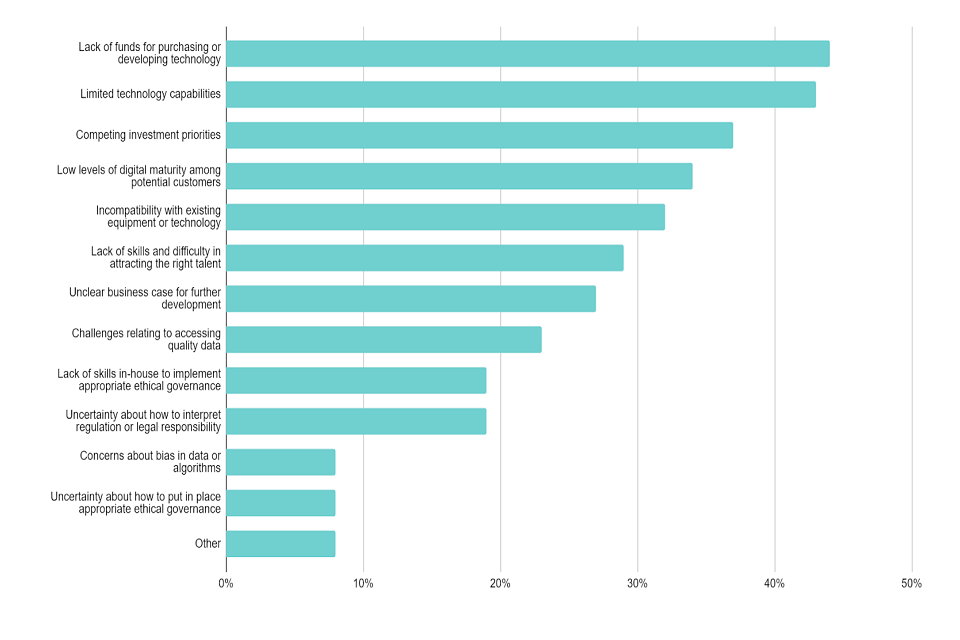
Barriers to Adoption for Users of Data-Driven Technology
2. Unclear governance
For users of data-driven technology, barriers around unclear governance were also prevalent, echoing feedback from our Barometer panels - a fifth (19%) of respondents felt that a lack of skills in-house to implement appropriate ethical governance was a limiting factor, with the same proportion viewing uncertainty about how to interpret regulation or legal responsibility as a barrier. This lack of clarity around governance was further reflected in answers around what types of support (beyond existing schemes) users would find useful to tackle existing barriers. Over two-thirds of users felt that subsidised or free legal support on how to interpret regulation would be useful, and this percentage was significantly higher (87%) for those who had already extensively deployed data-driven technology in their processes, again highlighting the variation in how barriers are experienced across the adoption lifecycle. A further 70% noted the need for additional legal guidance on what businesses are allowed to do in collecting, using, and sharing data, again rising for those who already have extensively deployed such technologies in their processes (78%).
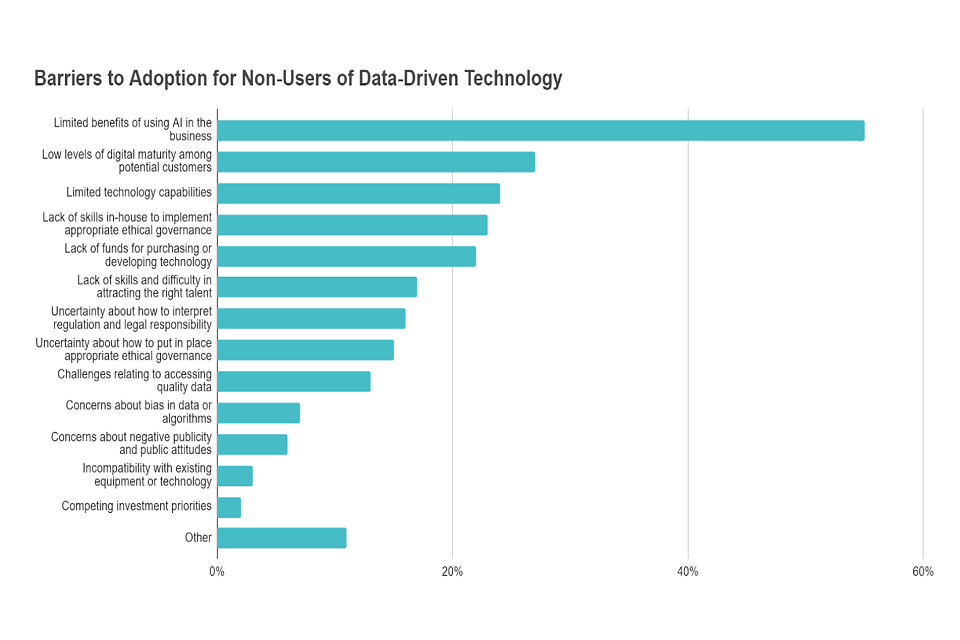
Barriers to Adoption for Non-Users of Data-Driven Technology
For non-users, barriers were broadly similar - although digital maturity was still prominent, a similar proportion of non-users as users saw issues relating to ethical governance as a limiting factor. These concerns are seen at similar levels across both those who plan to introduce the technologies in the future and those who don’t plan to, demonstrating that ethical concerns about technologies are relatively universal. Public attitudes to technology were typically not seen as a major barrier - 8% for users, 7% for non-users that don’t intend to implement, and just 1% for businesses that intend to implement, suggesting low perceptions of the risk of public backlash or mistrust.
Lack of in-house skills to implement ethical governance as a barrier
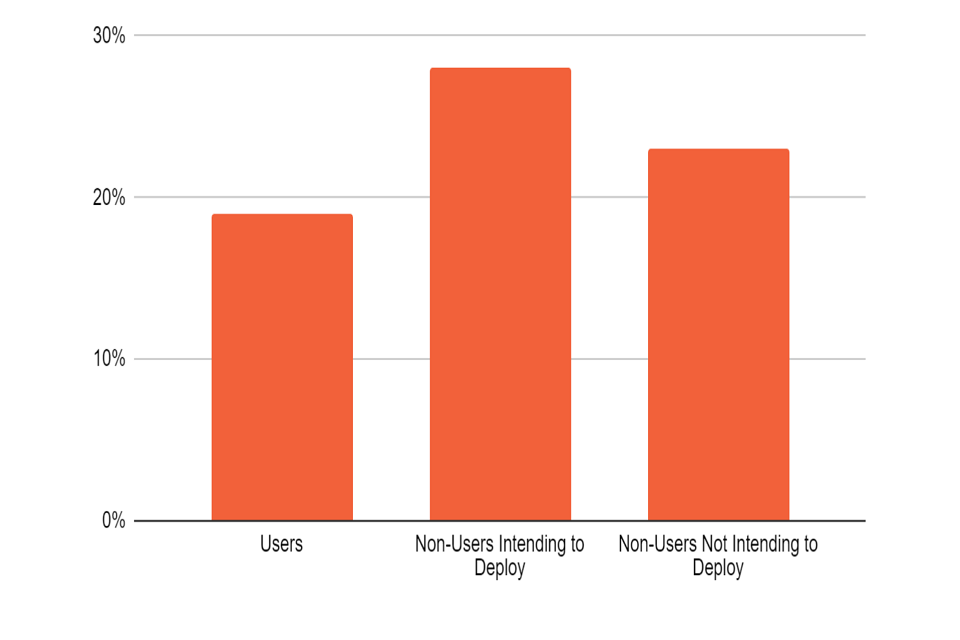
Lack of in-house skills to implement ethical governance as a barrier

Graph: Ethical concerns as a barrier to implementation
3. Investment
We asked non-users of data-driven technology if they had invested recently in ICT hardware and software, digital infrastructure, and/or digital training for employees. Although the majority had invested in at least some of the areas, those who didn’t intend to implement data-driven technology were on average less likely to have invested, with a significant difference seen for investment in software, digital infrastructure, and services by service providers. 44% of those who plan to introduce data-driven technology had invested in digital training for its workforce/managers, falling to 36% of those who do not plan to introduce. This lack of investment could be seen as contributing to the key barrier of a lack of digital maturity amongst potential customers, potentially creating a kind of feedback loop across different sectors of the economy.
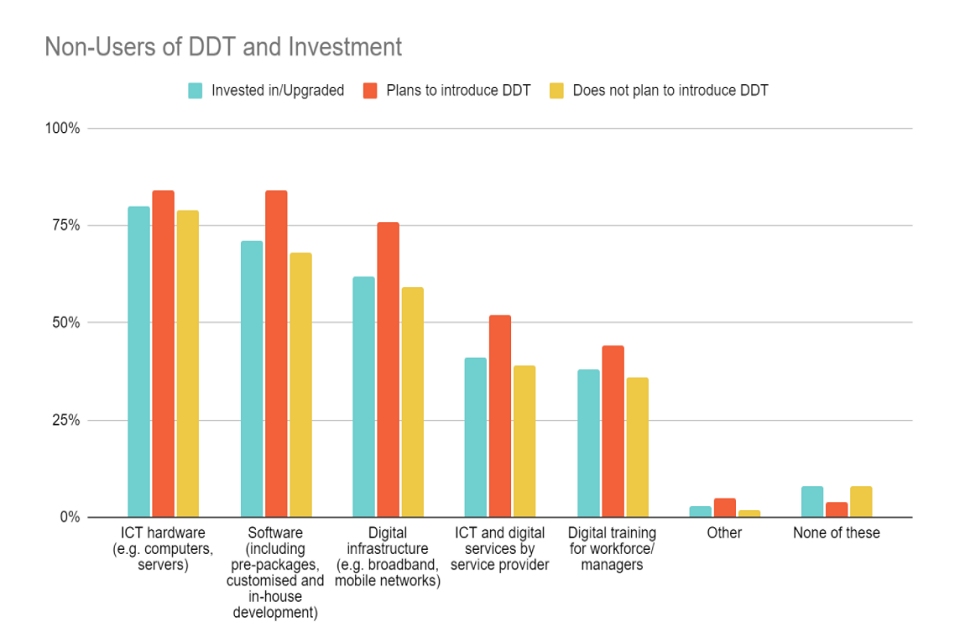
Graph: Non-Users of Data-Driven Technologies and Investment
One of the clearest barriers was reported as being the limited benefits of using such technologies in the business, particularly amongst those who do not plan to introduce data-driven technology in the future. A significantly higher number of respondents (62% compared to 32% of those who do plan to introduce data-driven technology in the future) stated that this was a barrier to its use. The vast majority of non-users of data-driven technology have no plans to introduce it in the future - 533 of 688 respondents - and this also seems to have a knock-on effect on investment in digital.
Intention to introduce data-driven technology by non-users
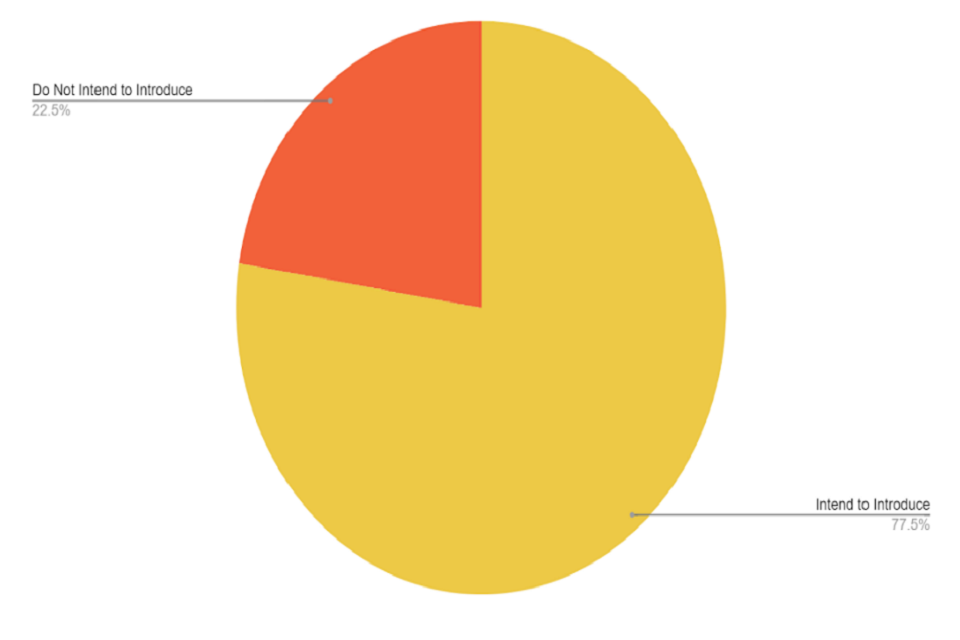
Intention to introduce data-driven technology by non-users
When looking at perceptions of non-users about the future, there continue to be substantial differences between firms who intend to introduce technology in the future, and those firms who do not. Intention to adopt emerging technology is related to perception of benefits that such technology may bring to a firm. The survey results suggest a lack of intention to introduce data-driven technologies correlates not only with being less likely to see the benefit in such technologies, but also with factors such as: seeing less of a need to improve data collection and management processes; less of a need to improve understanding of related legislation and regulation; less need to invest in the workforce to explore opportunities offered by data-driven technologies; and much less need to establish new collaborations on data-driven and AI projects.
-
We use ‘data-driven technology’ to broadly refer to tools and techniques that help to generate useful insights from data. This could range from the use of software for big data analysis, to process automation systems, as well as machine learning or other forms of artificial intelligence ↩
